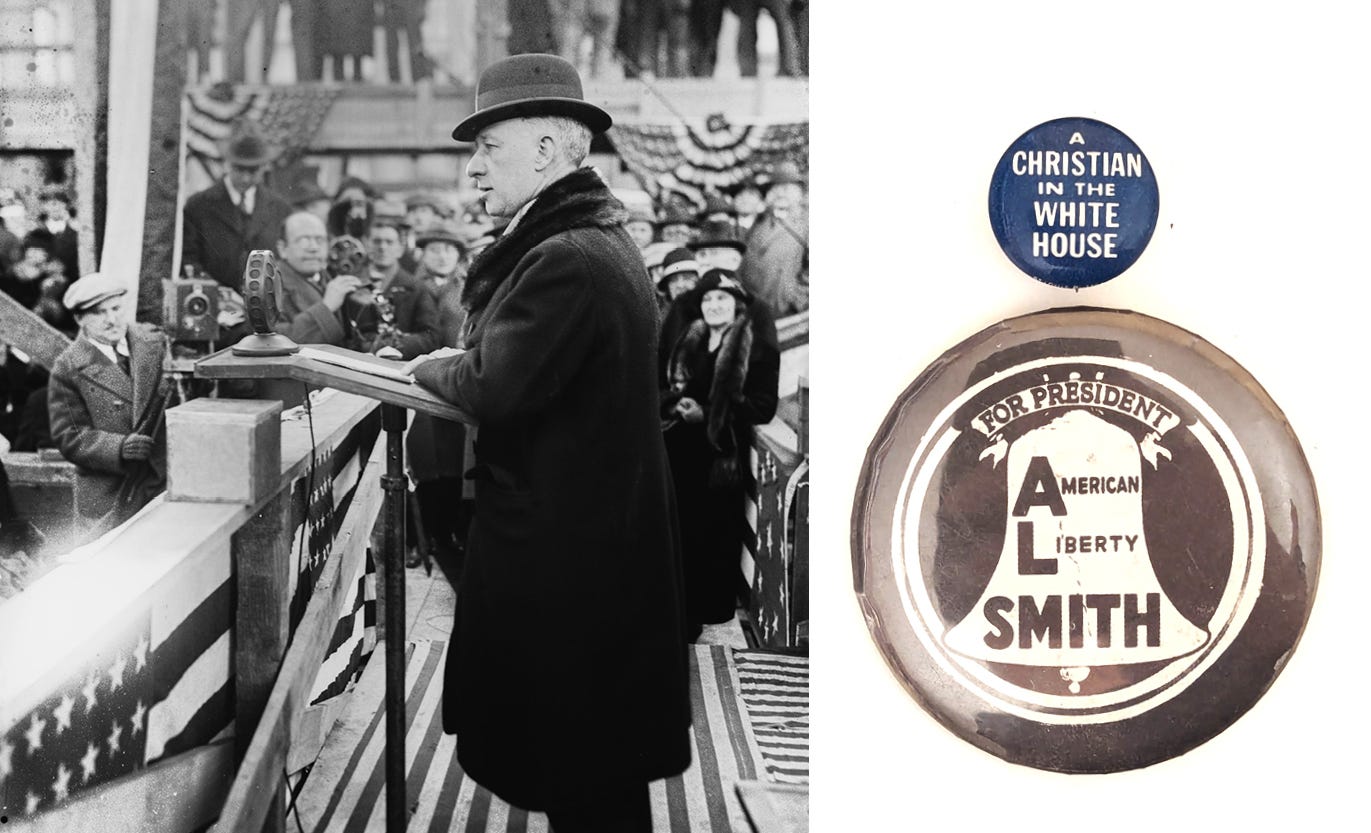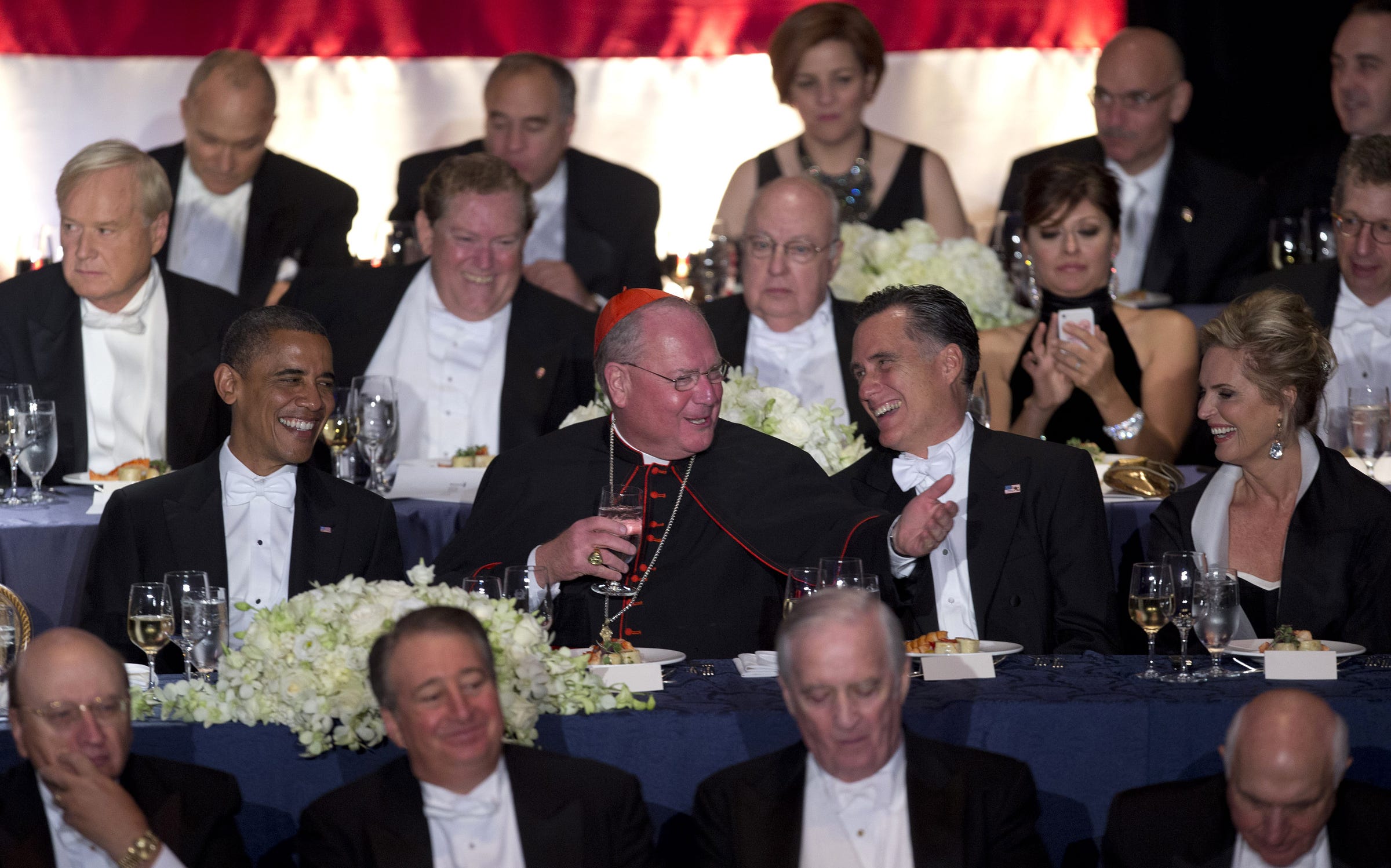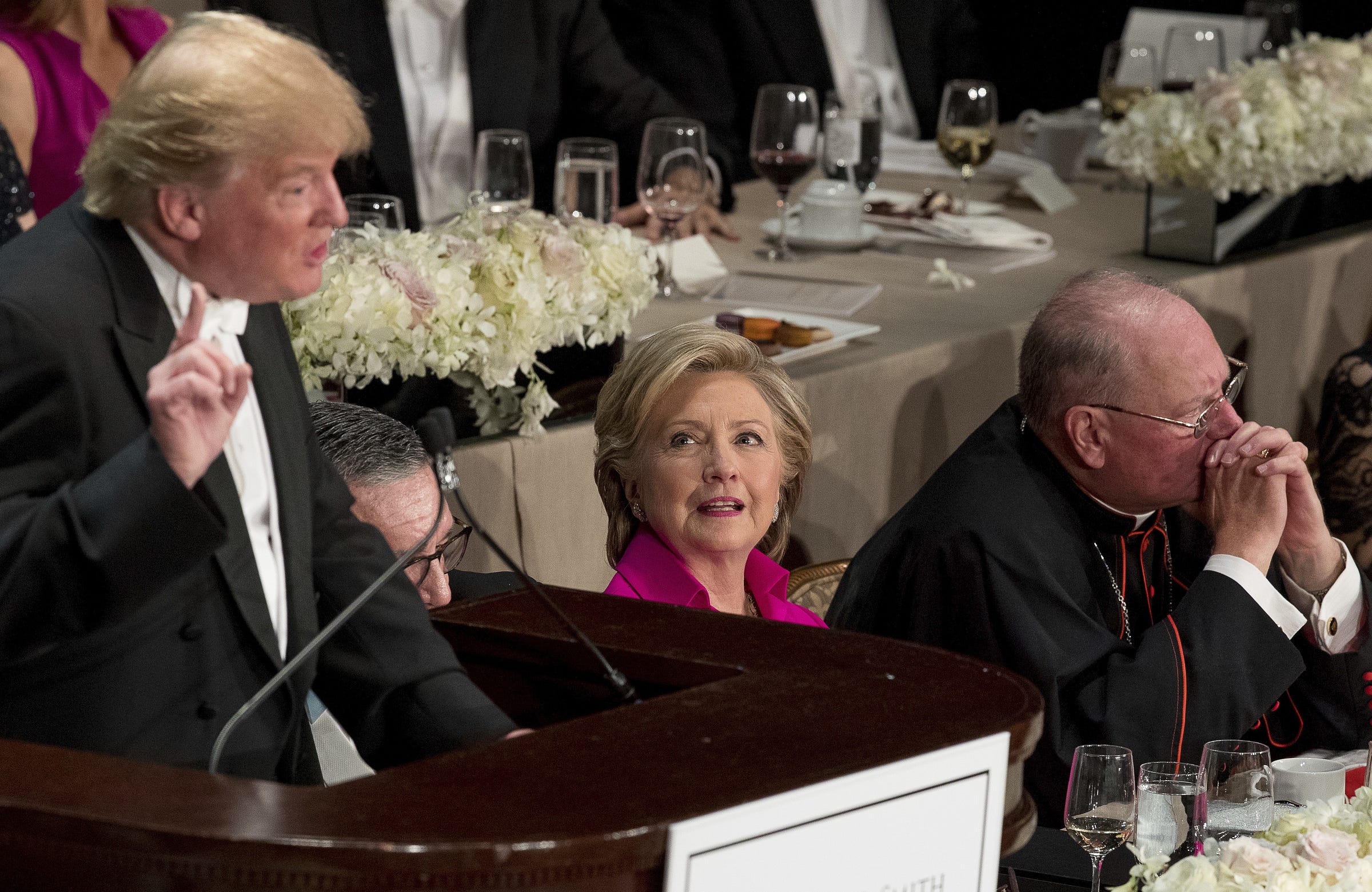Guess Who’s Not Coming to Dinner
There’s a massive new scandal that has political reporters buzzing. Vice President Kamala Harris won’t attend the Alfred E. Smith Memorial Foundation Dinner.
Seriously, there are dozens of articles framing this as a misstep by the Harris campaign. Every four years, the two presidential candidates show up for a fancy dinner in New York City where the men are expected to wear tuxedos and the women full-length dresses. The candidates are supposed to offer humorous remarks, telling good-natured jokes about themself and their opponent. All while the event, for which the cheap tickets are $5,000 each, raises millions of dollars for Catholic charities.
Harris’s campaign said she would instead be campaigning in a swing state that day. Cue the media outrage that Harris won’t show up to an elite dinner reporters like to cover.
Conservative outlets insisted this proves Harris is scared of unscripted moments, even though it’s literally a highly scripted event! Also, that’s a weird claim given her dominance in the presidential debate — and the fact that she’s not the one refusing to engage in another debate.
For instance, the National Review argued Harris “is afraid of the Al Smith Dinner,” adding that she was staying away since “she is genuinely trying to avoid unforced errors and exposure in uncontrolled environments. She is just too insecure.” A Fox News anchor declared Harris “is incapable of operating in a simple atmosphere like that” since “everything has to be so robotically scripted with her.” And a conservative Catholic publication asked rightwing Catholic activist Bill Donohue for comment. He claimed Harris must not be used to settings with “a jovial atmosphere,” adding, “Her less-than-average ability to think quickly on her feet surely must have been a factor in her taking a pass.”
Beyond the partisan press, others also questioned why she would skip the dinner. Political commentator Chris Cillizza called the move a sign of her campaign being “too careful” with unscripted events, but he added he didn’t think her absence would actually hurt her. And Semafor political reporter David Weigel questioned Harris’s decision since he said that “almost everyone walks away from this event looking better.” Thus, he asked, “What’s the argument for Harris to skip?”
Since Weigel asked, this issue of A Public Witness is here to help. Harris’s decision to skip the Al Smith Dinner — and the legacy of Smith (the first Catholic nominee for president) — offers important insights into this year’s campaign. As it turns out, there’s a more important question than asking why Harris is skipping.
Mr. Smith Doesn’t Go to Washington
In 1924, New York Democratic Gov. Al Smith sought his party’s presidential nomination on a progressive agenda of pushing civil liberties and denouncing lynching. Future President Franklin D. Roosevelt offered the nominating speech for Smith at the convention, calling the governor “the Happy Warrior of the political battlefield.” Smith represented the anti-Prohibition side of the party, while the son-in-law of former President Woodrow Wilson represented the “dry” side of the debate. Split between the two for 100 rounds of voting, the delegates eventually switched to a former congressman from West Virginia (who then lost to Republican Calvin Coolidge).
Four years later, Smith returned and captured the presidential nomination, making him the first Catholic nominated by a major party. His campaign against Republican Herbert Hoover was hurt by the economic prosperity that made the ruling party popular and by Smith’s position in favor of eliminating the prohibition against alcohol. But another area that hurt Smith was anti-Catholicism.
Bob Jones, an evangelist who had just founded the fundamentalist university bearing his name, was a strong proponent of Prohibition. But he especially feared Smith’s Catholicism as he urged votes against the Democratic standard-bearer: “I’ll tell you, brother, that the big issue we’ve got to face ain’t the liquor question. I’d rather see a saloon on every corner of the South than see the foreigners elect Al Smith president.” Many others echoed this sentiment. A Methodist newspaper called Catholicism “a degenerate type of Christianity” and a Baptist newspaper warned that as president Smith would close down all Protestant churches. Hoover’s campaign encouraged such bigotry with a button declaring, “A Christian in the White House.”
On election day in 1928, Hoover won in a landslide with 58% of the popular vote and 444 electoral college votes to Smith’s 41% and just 87 electoral college votes. While anti-Catholicism alone did not cost Smith the presidency, the bigotry contributed to the margin and served as a concern a generation later as fellow Catholic John F. Kennedy sought the presidency.

In 1946, New York Catholic Cardinal Francis Spellman created the Alfred E. Smith Memorial Foundation, and the group soon started an annual dinner to honor Smith and raise funds for Catholic groups. A tradition emerged to have the two presidential candidates speak at the dinner during an election year. It often becomes the last or one of the last times the two candidates appear together.
Additionally, given Smith’s reputation as a humorous speaker, the candidates’ speeches are supposed to be good-natured and funny. For instance, President Barack Obama in 2012 started by joking about his own poor performance in his first debate with Mitt Romney. He said, “As some of you may have noticed, I had a lot more energy at our second debate. I felt really well rested after the nice, long nap I had in the first debate. Although it turns out millions of Americans focused in on the second debate who didn’t focus in on the first debate — and I happen to be one of them.” He also took fun shots at his rival: “Earlier today, I went shopping at some stores in Midtown. I understand Governor Romney went shopping for some stores in Midtown.” But Obama also said nice things about his opponent, which is an expectation at the dinner: “I admire him very much as a family man and a loving father, and those are two titles that will always matter more than any political ones. So we may have different political perspectives, but I think — in fact, I’m certain — that we share the hope that the next four years will reflect the same decency and the same willingness to come together for a higher purpose that are on display this evening.”
Romney also modeled this spirit in 2012. He started by referencing the tuxes and fancy clothes everyone was wearing: “A campaign can require a lot of wardrobe changes. Blue jeans in the morning perhaps, suits for a lunch fundraiser, sport coat for dinner, but it’s nice to finally relax and to wear what Ann and I wear around the house.” He joked about Obama’s economic policies: “As President Obama surveys the Waldorf banquet room with everyone in white tie and refinery, you have to wonder what he’s thinking. So little time, so much to redistribute.” And Romney offered praise for Obama as a person: “Don’t tell anyone I said so, but our 44th president has many gifts and a beautiful family that would make any man proud. In our country, you can oppose someone in politics and make a confident case against their policies without any ill will and that’s how it is for me. There's more to life than politics.”
That kind of rhetoric has often made the Al Smith Dinner a unique moment on the campaign trail. That’s why the dinner’s been idolized on The West Wing as a high moment of campaign civility and why so many in the D.C. and New York media quickly questioned Harris’s decision to skip the event. But it’s not always been as jovial as the Obama-Romney matchup.

Trouble in Paradise
The last candidate to decline an invitation was Democrat Walter Mondale in 1984 at a time when he and especially his New York Catholic running mate, Geraldine Ferraro, clashed with the archbishop of New York and other Catholic leaders over abortion. However, it’s too simple to just say Harris is the first candidate not to appear in 40 years.
In both 1996 and 2004, the Archdiocese of New York decided to break precedent and not invite the presidential candidates. In 1996, the vice presidential candidates were instead invited after President Bill Clinton had vetoed an abortion bill. But in 2004, the tickets were left out as Catholic John Kerry sought the presidency. And then the COVID-19 pandemic disrupted the dinner in 2020. They held a virtual event, but the videos submitted by the candidates didn’t follow the humorous format, which would’ve been hard given the lack of a live audience. So with three of the last seven presidential cycles not including the traditional Al Smith Dinner interaction between the two presidential candidates, Harris isn’t breaking a tradition that’s as established as the Archdiocese and media coverage now suggest.
There’s another Al Smith Dinner that also deviated from custom, but it wasn’t because of the Archdiocese or a pandemic. In 2016, Donald Trump violated the norms and expectations of the event.
Trump started off with a few jokes, which he called “corny stuff.” But then Trump steered off course and offered personal and mean-spirited attacks generally viewed as inappropriate for the occasion. He called Clinton deceptive, corrupt, and “a nasty woman.” Trump’s remarks were considered so out of place that the audience actually booed him on multiple occasions. But he didn’t take the hint. Instead, he turned into another attack as he declared about the booing: “I don’t know who they’re angry at, Hillary, you or I. For example, here she is tonight, in public, pretending not to hate Catholics.” He then made an attack on Clinton’s aid work in Haiti, which sparked more booing.

After the 2016 Al Smith Dinner, numerous reports noted the awkwardness in the room during and after Trump’s remarks, as well as the unusual fact that neither candidate said anything nice about their opponent as is expected at the event. Alfred E. Smith V, a board member on the foundation honoring his namesake ancestor, afterward said it got “a little uncomfortable,” especially as Trump attacked Clinton on religious grounds. Smith added about Trump: “He crossed the line and took it a little too far.” Smith also said it impacted the feel in the room, with people laughing less for the rest of the night.
That was the last time the Al Smith Dinner in its traditional format was held. Why would Harris agree to participate with someone who has already proven himself unwilling to adhere to the rules for the night? An event based on encouraging civility doesn’t work when someone refuses to engage in civility. With Trump’s speeches at his rallies even less scripted and less disciplined than in his previous two campaigns, why would there be any expectation that he would behave this time? After all, in his statement this week criticizing Harris for planning to skip, Trump recounted his time in 2016 with “Crooked Hillary Clinton” and falsely claimed “the reviews of my remarks were TREMENDOUS.”
Even if Trump hadn’t violated the norms in 2016, on this side of the Jan. 6, 2021, insurrection, there’s a serious question about whether Trump should be treated as a normal candidate. Is it actually wise or appropriate for Harris to show up, say nice things about Trump, and join in a spectacle humanizing him as a normal politician? It was one thing for Obama and Romney. Sure, they had significant and important policy disagreements, but they also both respected democratic norms, were willing to admit when they lost, understood elections have consequences, and pledged to win or lose peacefully. But to pretend that Trump is such a candidate is to ignore the last eight years. The media — and the Archdiocese of New York — might largely be engaged in a process of “sanewashing” Trump, but that doesn’t mean Harris should participate.
Another reason Harris might have bailed is the fact the event is a fundraiser for Catholic charities chosen by the Archdiocese of New York. The list includes groups whose sole purpose is anti-abortion work. At a time when Harris is campaigning to protect medical access as maternal mortality rates have risen in the aftermath of the Supreme Court’s Dobbs decision, it’s hard to see her campaign wanting to prop up this event. In the waning weeks of the presidential campaign, spending time for a speech in a non-swing state that raises money for another group likely doesn’t make much sense to the campaign.
Trump’s behavior last time — as well as his behavior on Jan. 6, 2021, and his recent attacks on Haitian immigrants (that has sparked vitriol against a local Catholic charity) — should raise the question to the Archdiocese of New York: Why invite him? After all, twice in the last 28 years they didn’t invite the presidential candidates. Bill Clinton and John Kerry were unacceptable to even host, but Trump is fine?
Unlike Clinton and Kerry, Trump has weaponized religion. Not only did he attack Clinton on faith grounds during the 2016 dinner, he’s repeatedly attacked the Catholic faith of President Joe Biden, the second Catholic president and the president in the modern era who has attended worship services more than any other. And after Harris announced she would skip the dinner, Trump immediately leveled religion-based attacks on her. He called her “anti-Catholic” and falsely claimed “Catholics are literally being persecuted by this Administration.” He added, “Any Catholic that votes for Comrade Kamala Harris should have their head examined.” This fits a pattern of attacking the faith of people who oppose him politically, including his attacks on the faith of Muslims and Jews. Trump even used the National Prayer Breakfast to attack the religiosity of Mitt Romney and Nancy Pelosi.
Trump is demonstrating today that if he had been around in 1928, he would’ve likely joined the attacks on the Catholic faith of the Democratic presidential hopeful. Fêting Trump at a dinner named for Al Smith would be a funny punchline if it wasn’t actually happening.
As a public witness,
Brian Kaylor



Thank you for the history lesson. I am in complete agreement with your take and support VP Harris in declining to attend.